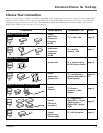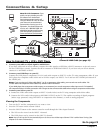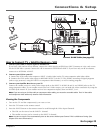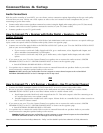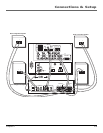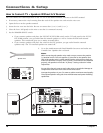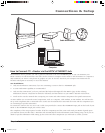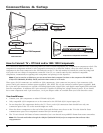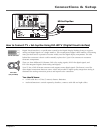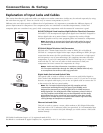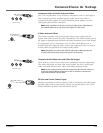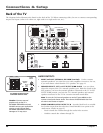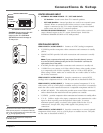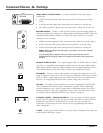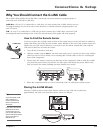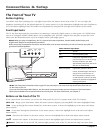
Connections & Setup
Chapter 1 17
How to Connect: TV + Set-top Box Using DVI-HDTV (Digital Visual Interface)
Digital Visual Interface is a specification created by the Digital Display Working Group to support
analog and digital signals on a single interface. This uncompressed digital video interface is becoming
more prevalent and is expected to become widely used for digital display components. The idea
behind the connector is that it could eventually replace the 15-pin VGA connector in consumer
electronic components.
There are three different DVI formats: DVI-A for analog signals, DVI-D for digital signals, and
DVI-I for integrated signals (both analog and digital).
Your TV has a DVI-D format connector and supports some digital signals. The format is used for
direct digital connections between source video and provides a higher-quality image than analog. It
eliminates the analog conversion process and improves the connection.
You should know:
•A DVI cable has a 15 feet (5 meters) distance limitation.
• Audio information is carried separately; therefore, connect audio left and right cables.
VIDEO
INPUT 1
AUDIO
INPUT 1
L/
MONO
R
VIDEO
INPUT 2
AUDIO
INPUT 2
S-VIDEOS-VIDEO
VIDEO
INPUT 3
AUDIO
INPUT 3
V
L/
MONO
R
V
L/
MONO
R
V
P
B
Y
P
R
L/
MONO
R
VIDEO
INPUT 4
AUDIO
INPUT 4
AUDIO
INPUT 5
L/
MONO
R
V
P
B
Y
P
R
VIDEO
INPUT 5
R
L
LEFT
EXT
SPEAKER
SELECT
INTERNAL
SPEAKER
SOURCE
EXTERNAL AMPLIFIER
MAXIMUM POWER RATING
(60 WATTS into 8 OHMS)
CENTER CHANNEL INPUT
RIGHT FIXED/VARIABLE
AUDIO
OUTPUT
EXTERNAL SPEAKERS
TV EXT AMP
INT W/
EXT
SURR
ANTENNA B
INPUT
ANTENNA A
INPUT
ETHERNET
G-LINK
VIDEO
RECORD
OUTPUT
AUDIO
R
L
DIGITAL
AUDIO
OUTPUT
TV
DVI-HDTV
L
R
HD Set Top Box
DVI-D Connector
DVI Cable
(not provided)



